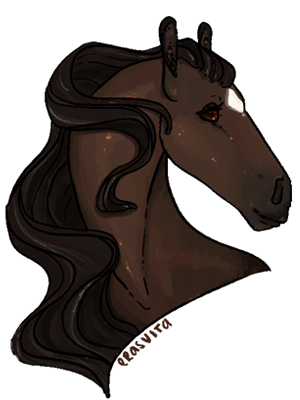
A S T E R I O N
in sunshine and in shadow*
It is strange to look out over the sweep of grasses, the pale washes of cloud, and see all as it should be. Asterion supposes he should be glad of it - glad there are grasses at all, after the frozen mud and desolate, barren ground of last winter - but his memory of the disasters is still too strong. The king knows where to look to find evidence of mudslides and of sinkholes; Terrastella is like a cracked vase with a new coat of paint.
He supposes its people are much the same. Certainly he is; no longer washboard-ribbed, or dull-coated and weary, but the dark of his eyes is more faraway than it had ever been before.
The bay turns inside before he sees the fleck of gold galloping toward the keep; as he does the gull (who had been perched on his withers, picking idly at the strands of silver in his mane) takes off, sweeping toward the sea, wings wide to ride the wind. As Florentine steps within the castle her brother steps into the throne room, away from the wind that brings him the scent of the sea and the rich verdant smell of summer. The stained glass windows (all the colors of dusk and of his skin, rose and indigo, soft violent and coral) cast light across the stone floor, across his back. His court’s colors are the only garments Asterion wears.
For a moment he studies the dais, rough stone cut from the cliffs, pale weathered wood gathered from the shore and felled from the swamp. It is handsomely, lovingly made; how many rulers, he wonders, has it seen and survived? One day (and here something stirs in him, uncomfortable at the thought) it will remain and he will be gone. One way or another, whether he goes to the earth or to new worlds, he will only be another saltwater memory, another wave that has come and passed.
Asterion, comes the rough voice down the echoing hallway of his bond with Cirrus. His name is all she says, and all she needs; the tone is wry and warning and not at all new. The king huffs a laugh, and turns away from that ancient throne.
And as he does his sister steps into the room.
Like Cirrus, she says far more things in her naming him that one word should convey; at once his gaze focuses on her, searching for hurts, searching for the laughter she wears as well and constantly as her flowers or the smile on her face. It has been as absent as his own, the past few months, and the sorrow that pricks her is the same well within him. It laps at his soul and is fed with each new wound and oh, its waters are dark. And yet, and yet.
He goes to her, his gaze brushing like fingertips across her injured wing. His conversation with Marisol in Denocte echoes like ripples in his mind, the way she’d said flying was terrible because it could be lost, the look in her eyes as she’d said it.
Asterion touches his dark muzzle to his sister’s cheek, inhales the sweet-summer scent of her. He says nothing of the way her dagger is missing from its place around her neck; he only whuffs a warm breath against her ear.
“Florentine,” he says, and smiles against the sorrow he can feel in them both. “I hope you haven’t brought me any fresh trouble.”
@
